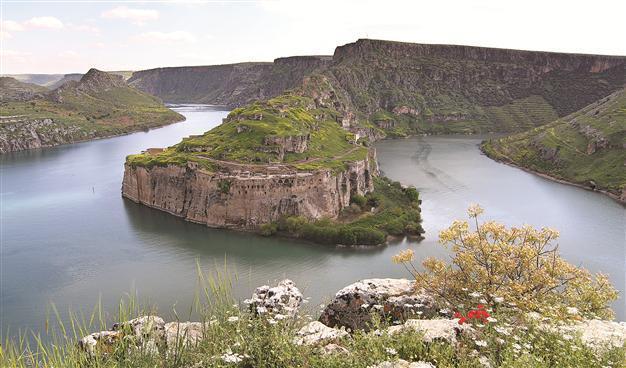Historic castle turns ‘touristic’
GAZİANTEP - Anadolu Agency

AA Photo
The historic Rumkale (“Roman Castle”), which was home to many civilizations throughout history and an important center for early Christianity, has been undergoing a restoration process for more than two years.
Rumkale and its vicinity, which straddles the boundary between the southeastern provinces of Gaziantep’s Nizip and Yavuzeli districts and Şanlıurfa’s Bilecik and Halfeti districts, is home to structures from the Urartu, Babylon, Sumerian, Seljuk and Ottoman eras.
Johannes, one of the apostles of Jesus Christ, is said to have settled in Rumkale during the Roman era and reproduced copies of the Bible.
The area was occupied by various Byzantine and Armenian warlords during the Middle Ages. The castle served as the seat of an Armenian patriarch in the 12th century.
From 1203 to 1293, it was the residence of the supreme head (Catholicos) of the reunified Armenian Church. In 1293, it was captured by the Mamluks of Egypt, following a protracted siege.
Monastery Restoration
Restoration work is currently continuing in the Barşavma Monastery, which was built in the 13th century and is located in the north side of the castle.
Yavuzeli District governor Ömer Faruk Güngen said Rumkale was a hidden haven and shining star in the southeastern Anatolian region.
Speaking of its importance in nature and faith tourism, Güngen said, “We need to offer Rumkale to tourists. People should know about the ruins and natural beauties here.”
He said facilities would be established in the area for tourists to spend more time in the region, adding, “Our projects will also employ people living here. Our goal is to increase the contribution of Rumkale to the Turkish economy. This place is a hidden haven that people cannot come and see. It has a rich history. More artifacts are found as excavations deepen. Rumkale’s promotion is important to us.”
The head of the excavations, Bora Cem Sevencan, said Rumkale also had importance in terms of art history and a common heritage of humanity. “The area will be a junction point for faith tourism when the work is done,” he said.
